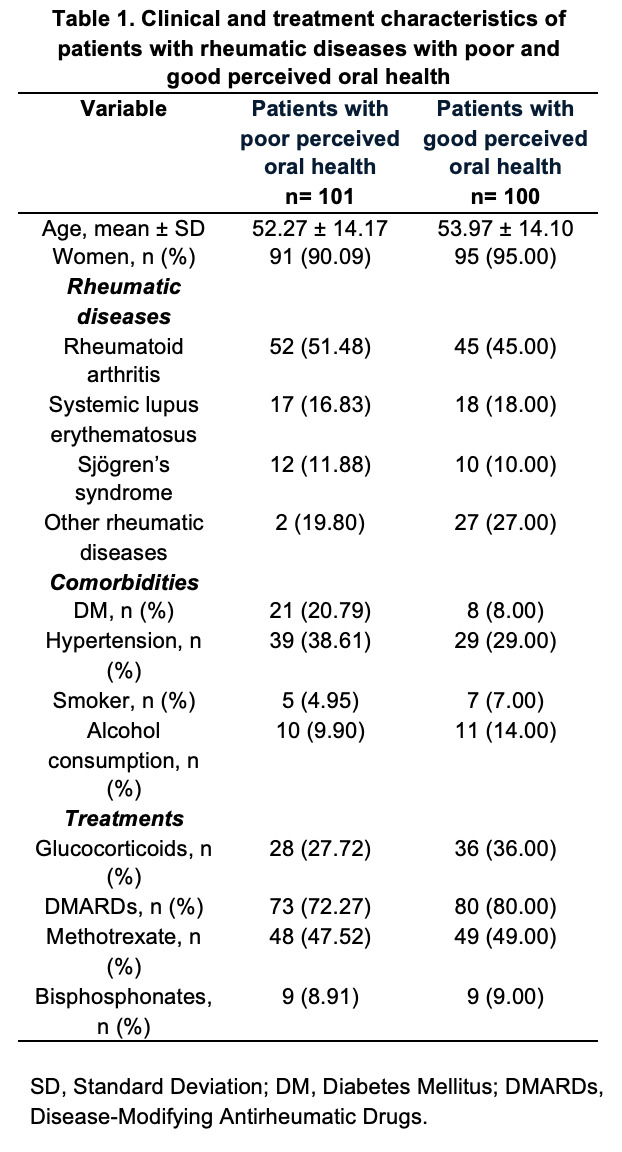Session Information
Date: Sunday, October 26, 2025
Title: (0357–0386) Patient Outcomes, Preferences, & Attitudes Poster I
Session Type: Poster Session A
Session Time: 10:30AM-12:30PM
Background/Purpose: Oral health conditions are frequent in patients with rheumatic diseases and can impact daily function and quality of life. Factors such as chronic inflammation and immunosuppressive therapies may contribute to dental complications, including caries, xerostomia, and temporomandibular dysfunction. While clinical assessments are essential, patient-reported outcomes offer additional perspective on perceived oral health needs. Understanding the relationship between self-perceived oral health and clinical findings can enhance screening and support integrated management in rheumatology care.
Methods: We conducted a cross-sectional study including adult patients with rheumatic diseases, consecutively recruited from a tertiary care rheumatology clinic. Patients were categorized into good perceived oral health and poor perceived oral health groups according to General Oral Health Assessment Index (GOHAI) score-based thresholds. Clinical characteristics, comorbidities, and treatments were documented. Oral health status was evaluated using the GOHAI, International Caries Detection and Assessment System (ICDAS) caries assessment, salivary parameters (pH and flow rate), xerostomia, and temporomandibular joint examination. All oral examinations were performed by a board-certified dentist trained in standardized assessment protocols. Behavioral data included dental visit frequency and toothbrushing habits. Statistical comparisons were performed using chi-square and Student’s t-tests, with significance defined as p < 0.05.
Results: A total of 201 patients with rheumatic diseases were included, divided into poor perceived oral health (n=101) and good perceived oral health (n=100) groups. The mean age was 52.27 ± 14.17 and 53.97 ± 14.10 years, respectively, with a higher proportion of women in both groups (90.09% vs. 95.00%). Rheumatoid arthritis was the most prevalent diagnosis, additional demographic and clinical characteristics are displayed in Table 1. The poor perceived oral health group reported a greater desire for dental referral (84.15% vs. 72.00%; p=0.037, Table 2). The poor perceived oral health group showed lower scores in physical function (14.00 ± 2.49 vs. 17.85 ± 2.07; p< 0.001), psychosocial function (17.62 ± 2.63 vs. 21.91 ± 2.29; p< 0.001), and pain/discomfort (9.00 ± 2.25 vs. 13.21 ± 1.53; p< 0.001, Table 3).Clinically, the poor perceived group had a lower percentage of caries-free teeth (39.99% vs. 48.57%; p< 0.001), and a higher prevalence of severe caries (3.81% vs. 1.96%; p< 0.001) and missing teeth (24.39% vs. 17.82%; p< 0.001), while initial and moderate caries stages showed no significant differences between groups. Salivary flow rate was higher in the good perceived group (0.40 ± 0.58 mL/min vs. 0.20 ± 0.28 mL/min; p=0.019).
Conclusion: Poor self-perceived oral health was associated with greater impairment in oral health–related quality of life, higher prevalence of severe caries and tooth loss, and increased demand for dental referral. These results highlight the importance of combining patient-reported oral health measures with clinical evaluations to enhance detection and management of oral health issues in rheumatic patients.
 Table 1. Clinical and treatment characteristics of patients with rheumatic diseases with poor and good perceived oral health
Table 1. Clinical and treatment characteristics of patients with rheumatic diseases with poor and good perceived oral health
.jpg) Table 2. Self-perceived oral health and quality of life measures of patients with rheumatic diseases with poor and good oral perceived oral health.
Table 2. Self-perceived oral health and quality of life measures of patients with rheumatic diseases with poor and good oral perceived oral health.
.jpg) Table 3. Clinical and behavioral oral health assessment of patients with rheumatic diseases with poor and good perceived oral health
Table 3. Clinical and behavioral oral health assessment of patients with rheumatic diseases with poor and good perceived oral health
To cite this abstract in AMA style:
Garcia-Garcia F, Alarcon-Jarquin M, Lopez-Flores V, Castro-Cruz G, Estrada-Anguiano C, Garcia-Bravo J, Gonzalez-Melendez A, Figueroa-Parra G, Galarza-Delgado D, Riega-Torres J. Dental Findings in Patients With Rheumatic Diseases and Its Association With Self-Perceived Oral Health [abstract]. Arthritis Rheumatol. 2025; 77 (suppl 9). https://acrabstracts.org/abstract/dental-findings-in-patients-with-rheumatic-diseases-and-its-association-with-self-perceived-oral-health/. Accessed .« Back to ACR Convergence 2025
ACR Meeting Abstracts - https://acrabstracts.org/abstract/dental-findings-in-patients-with-rheumatic-diseases-and-its-association-with-self-perceived-oral-health/
